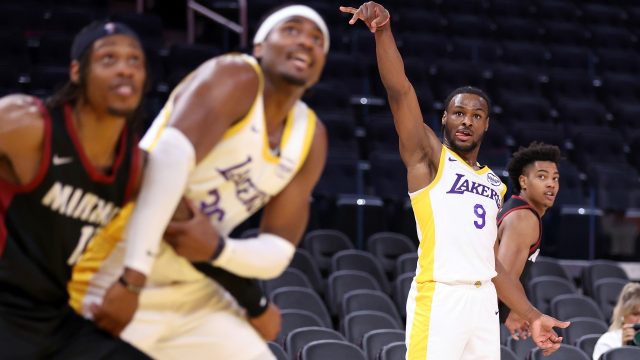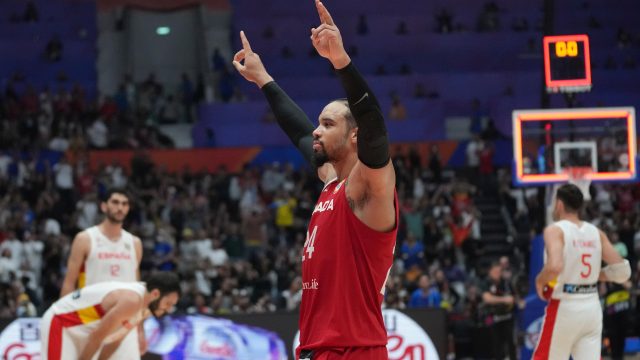
LAS VEGAS — They booed us. As the Canadian men’s national team took the floor at sold out T-Mobile Arena to take on Team USA, the boos came raining down.
What did Dwight Powell ever do to deserve such callous treatment?
Not be American, turns out. Not be superstars (even Hamilton’s Shai Gilgeous-Alexander got a nice cheer when he was introduced; it’s Vegas, they love a sure thing), I guess.
The Canadian men’s team was a fun idea when they were an up-and-coming story in the world of international basketball. But snatch one World Cup bronze medal from Team USA and all of a sudden you’re reminded you’re in enemy territory.
“What did you expect them to do?” said RJ Barrett, who started for Canada alongside Jamal Murray, Dillon Brooks, Dwight Powell and Shai Gilgeous-Alexander. “We’re in their country, so, you know, that was expected.”
It didn’t take newly naturalized American citizen Joel Embiid long to take it all literally, as Powell’s face can attest. It wasn’t just the crowd that was amped, so was Embiid, who performed like it was a playoff game for him — which is to say, not very well as he finished with just five points, six rebounds and four turnovers is his Team USA debut.
He took out his frustrations out on Powell, first simply shoving the undersized Dallas Mavericks centre to the floor and then, in the third quarter, elbowing him in the chin, earning an unsportsmanlike foul in the process.
Embiid professed his innocence, but the tape didn’t lie, and he got the foul.
That Canada was able to frustrate Embiid was a good sign in an otherwise unremarkable 86-72 loss that had some encouraging moments, but mostly had the look of two teams trying to find their sea legs. Unfortunately for Canada it was the powerhouse U.S. side — being able to bring Jayson Tatum and Anthony Edwards off the bench are luxuries no other team in the world can match — that got their rhythm sooner.
Canada struggled to score, even with the addition of Denver Nuggets star Murray, playing for Canada for the first time since 2015, weeks after finishing high school. Murray shot just 2-of-8 from the floor and was 1-of-5 from three. Canada as a whole shot just 33.7 per cent form the floor and made 7-of-33 triples.
“When I got my first bucket, I’m like, ‘Damn, it’s been a minute since I had this jersey on.’” said Murray. “So, also the jitters were there for sure. I haven’t felt that kind of — I felt real fresh out there, you know what I’m saying? It was just really nice going to have the Canada on my back and now play with these guys. We’re all getting used to building that kind of chemistry. Definitely a special moment. I’ll shoot better next time.”
Gilgeous-Alexander was 3-of-10 from the floor with three assists while Murray didn’t have any assists. Canada only had three double-digit scorers. Team USA was led in scoring by Edwards with 13 points as the Americans had four players in double digits.
But overall it was Canada’s passiveness in the face of Team USA’s switching schemes that frustrated Canadian head coach Jordi Fernandez.
“Obviously they are very good defensive players,” he said. “They switched a lot and we just stared at the switch the whole time … I just did not like the way we played, regardless of the score. That’s not who we are, how we want to play, who we want to be … again credit to this team, which is a very good team. It’s not about the win or the loss, it’s the way we played.”
It was the U.S. star-laden bench unit that helped them shake off a 21-14 lead Canada had been able to jump out to after the first quarter, outscoring Canada 27-12 in the second quarter, allowing them to take an 41-33 lead into half that Canada couldn’t make a dent in. By that time, the U.S. had tallied six of their nine blocked shots, as Canada didn’t have much success when they did attack the paint. Meanwhile at the other end, Canada’s lack of rim protection was apparent as the U.S. was shooting 73 per cent on two-point shot attempts.
Canada had promised to play hard, fast and physical in their first preparation game for the Olympic tournament which tips off on July 27. They managed two out of three, but if anything it was the U.S. that was best able to control the pace as Canada managed just two fastbreak points and was 1-of-6 converting their fastbreak opportunities, according to Fernandez.
But Canada was scrappy. Not surprising Brooks was in the mix early, he even was able to get under LeBron James‘ skin early as the Team USA star couldn’t resist a shoulder bump after an early turnover.
But it was Embiid who seemed the most bothered by Canada’s willingness to engage physically. For Powell it was just business as usual and that’s what Canada is going to need to be willing to do in order to excel against top-quality international competition.
“He’s extremely skilled player, obviously extremely powerful, has size, so we had to make sure we were meeting him with force,” said Powell, who was giving up at least four inches and 50 pounds to the Philadelphia 76ers star.
“He didn’t think he did [hit me with his elbow]but it’s all good in competition, you know how it is. At the international level especially there can be moments like that. You’re competing for your country so you understand there’s high emotions and people are playing hard.”
The tide began to turn in the second quarter when U.S. head coach Steve Kerr went back to his starters while Fernandez still had his bench group on the floor. Nickeil Alexander-Walker got blocked on a fadeaway by Jrue Holiday that led to jumper by Devin Booker that gave the U.S. its first lead. Alexander-Walker got blocked again on the next possession, this time at the rim by LeBron James, leading to a transition three by Booker that put Team USA up by five.
Canada was never able to regain the lead, but they got a feel for what they will be up against as they leave Thursday morning for France where they have three more exhibition games and a closed scrimmage scheduled before the Olympics start.
They have plenty of loose ends to tie up but having jumped in at the deep end — the U.S. is the leading favourite to bring home a gold medal for the seventh time in the past eight Olympic tournaments — they have a good reference point for where they want to go, and a first-hand reminder that it won’t be easy to get there.






